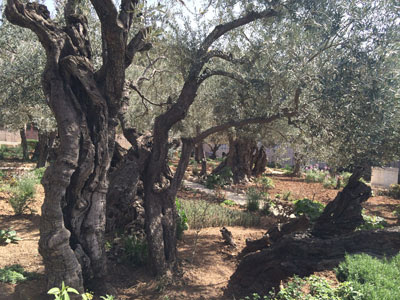Reading devotions and blogs from my favorite writers early this morning, a daily devotion came through about the olive tree. My first reaction was "Yuck!" an olive is one of three foods I will not eat.
Even though it is among one of the worst foods, for me, I am impressed with its life process much like the resilience of a palm tree and so I wanted to share ...
Even though it is among one of the worst foods, for me, I am impressed with its life process much like the resilience of a palm tree and so I wanted to share ...
"We are hard pressed on every side, but not crushed; perplexed, but not in despair; persecuted, but not abandoned; struck down, but not destroyed." 2 Corinthians 4:8-9
Jesus often met in the shadow and shade of the olive tree.
The olive grove mentioned above is the Garden of Gethsemane.Jesus knew the crushing-heart feeling. He felt it. He wrestled with it. He carried it.
And I don't think it was a coincidence the olive tree was there in this moment of deep sorrow for Jesus.

The crushing times are necessary times.
First, in order to be fruitful the olive tree has to have both the east wind and the west wind. The east wind is the dry hot wind from the desert. This is a harsh wind. So harsh that it can blow over green grass and make it completely wither in one day.
The west wind, on the other hand, comes from the Mediterranean. It brings rain and life.
The olive tree needs both of these winds to produce fruit ... and so do we. We need both the winds of hardship and winds of relief to sweep across our lives if we are to be truly fruitful.
The crushing times are processing times.
Another thing to consider about the olive tree is how naturally bitter the olive is and what it must go through to be useful. If you were to pick an olive from the tree and try to eat it this month, its bitterness would make you sick.
For the olive to be edible, it has to go through a lengthy process that includes:
washing,
breaking,
soaking,
sometimes salting,
and waiting some more.
washing,
breaking,
soaking,
sometimes salting,
and waiting some more.
It is a lengthy process to be cured of bitterness.
If we are to escape the natural bitterness of the human heart, we have to go through a long process as well ... the process of being cured.
The crushing times are preservation times.
The final thing I want to consider about the olive is not just how bitter it is, but also how strong and hard it is when picked straight from the tree. If you are harvesting olives for oil, you must pray for a soaking rain to come if you hope to get oil from the olives. It needs a hard rain of at least two to three hours so the water can make it all the way up the roots, through the tree and to the olives.
Then the olives can be picked and preserved.
And the best way to preserve an olive for the long run? Crush it and extract the oil from it.
The same is true for us. The biblical way to be preserved is to be pressed. And being pressed can certainly feel like being crushed.
2 Corinthians 4:8 says we are "pressed ... but not crushed"
Crushing isn't the olive's end.
Crushing is the way of preservation for the olive. It's also the way to get what's most valuable, the oil, out of the olive. Keeping this perspective is how we can be troubled on every side yet not distressed ... pressed to the point of being crushed but not crushed and destroyed.
When I'm being processed, I forget it's for the sake of ridding me of bitterness.
And when I'm being crushed, I forget it's for the sake of my preservation.
I forget all these things so easily. I wrestle and cry and honestly want to resist every bit of this. Oh, how I forget.
Maybe God knew we all would forget.
And so, He created the olive tree.